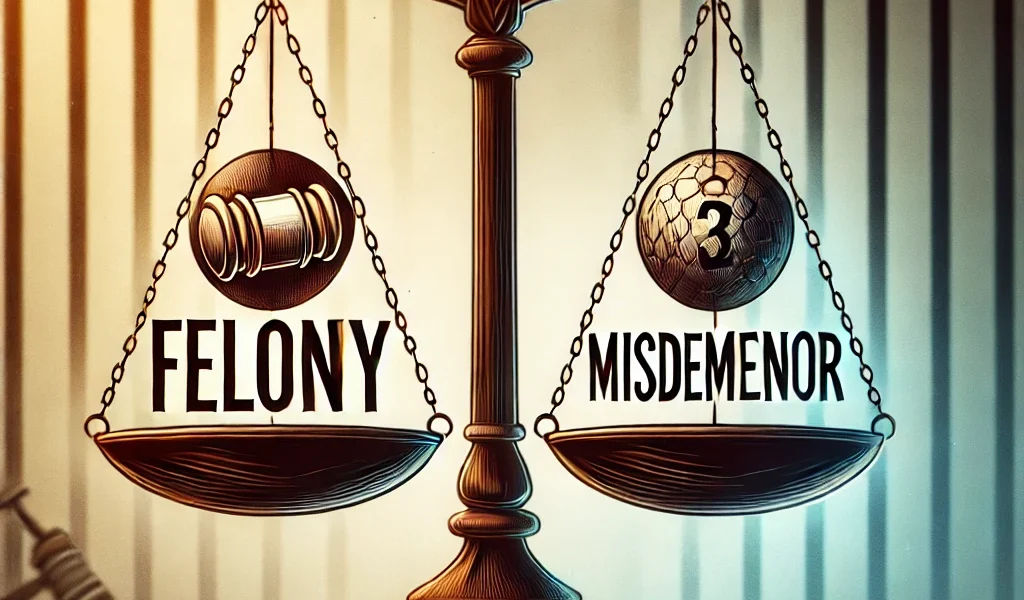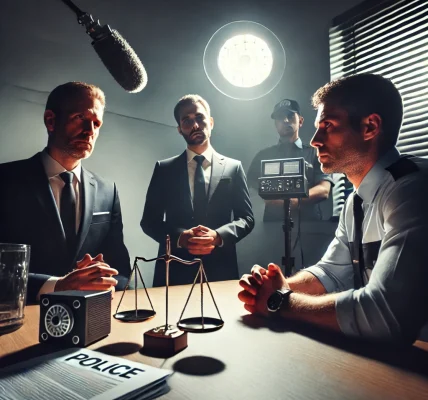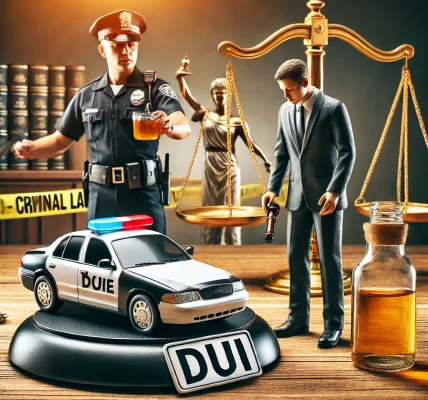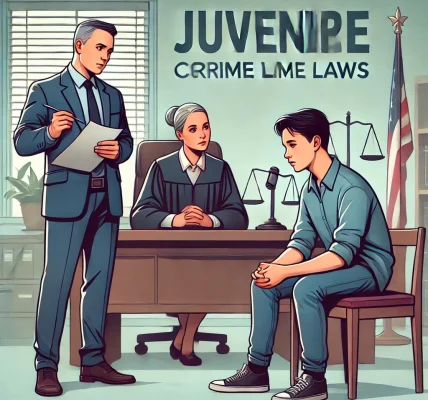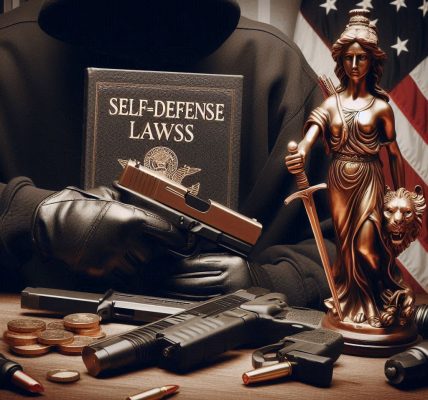Introduction
In the criminal justice system, crimes are generally classified into two main categories: felonies and misdemeanors. Understanding the differences between these classifications is crucial, whether you are facing charges, involved in a legal dispute, or simply interested in how the law works. Each category carries different legal consequences, affecting everything from potential penalties to long-term impacts on a person’s life.
In this blog, we will explore the key distinctions between felonies and misdemeanors, including examples, penalties, and the legal processes involved in handling these charges.
1. What Are Misdemeanors?
A misdemeanor is a less severe criminal offense compared to a felony. Misdemeanors typically involve lower-level crimes that do not result in severe harm to others. While they are still considered crimes and can have significant consequences, the penalties are generally lighter than those for felonies.
Common Examples of Misdemeanors
- Petty Theft – Stealing low-value items (varies by jurisdiction)
- Simple Assault – Minor physical altercations without serious injuries
- Public Intoxication – Being visibly intoxicated in a public place
- Disorderly Conduct – Disrupting public order or causing disturbances
- Trespassing – Entering private property without permission
- Reckless Driving – Driving dangerously but without serious injury or fatalities
Penalties for Misdemeanors
The penalties for misdemeanors vary by state, but they typically include:
- Jail time (usually less than one year)
- Fines (ranging from a few hundred to a few thousand dollars)
- Probation (instead of or in addition to jail time)
- Community service
- Temporary loss of certain rights (e.g., driving privileges for DUI offenses)
Misdemeanor convictions usually do not lead to lifelong restrictions but can still impact employment, housing, and reputation.
2. What Are Felonies?
A felony is a serious criminal offense that typically involves violence, large-scale fraud, or other significant harm. Felonies carry much harsher penalties than misdemeanors and can have long-term consequences on a person’s rights and future opportunities.
Common Examples of Felonies
- Murder & Manslaughter – Intentional or reckless killing of another person
- Rape & Sexual Assault – Non-consensual sexual acts
- Aggravated Assault & Battery – Attacking someone with a weapon or causing severe injury
- Burglary & Robbery – Breaking into a property or using force to steal
- Drug Trafficking – Selling or distributing large quantities of illegal drugs
- White-Collar Crimes – Fraud, embezzlement, or large-scale financial crimes
Penalties for Felonies
The penalties for felonies vary widely based on the crime, jurisdiction, and circumstances, but they typically include:
- Prison time (usually one year or more, often in a state or federal prison)
- Hefty fines (thousands to millions of dollars, depending on the case)
- Probation or parole after release
- Loss of certain rights, such as voting or firearm ownership
- Lifetime criminal record, which can affect employment, housing, and civil liberties
3. Key Differences Between Felonies and Misdemeanors
| Feature | Misdemeanor | Felony |
|---|---|---|
| Severity | Less severe | More severe |
| Punishment | Up to 1 year in jail | More than 1 year in prison |
| Fines | Lower amounts | Higher amounts, sometimes in millions |
| Rights Affected | Usually temporary (e.g., license suspension) | Permanent (e.g., loss of voting rights, firearm ownership) |
| Examples | Disorderly conduct, petty theft | Murder, armed robbery, drug trafficking |
| Long-Term Impact | Minor impact on record | Major impact on employment, housing, and rights |
4. Wobblers: When a Crime Can Be Either a Felony or a Misdemeanor
Some crimes fall into a gray area and are referred to as “wobblers.” These offenses can be charged as either a misdemeanor or a felony, depending on:
- The severity of the crime
- The defendant’s prior criminal record
- The circumstances of the offense
Examples of Wobbler Crimes
- DUI (Driving Under the Influence) – Can be a misdemeanor for a first offense but a felony if it causes injury or is a repeat offense
- Assault with a Deadly Weapon – Can be a felony if it results in serious injury, but a misdemeanor if no harm occurs
- Grand Theft – If the stolen property value exceeds a certain threshold, it may be charged as a felony
A judge or prosecutor often decides how to charge a wobbler offense based on the case details.
5. Legal Process for Misdemeanors vs. Felonies
The legal process for handling misdemeanors and felonies differs significantly. Here’s an overview of each:
Misdemeanor Legal Process
- Arrest or Citation – The defendant may be arrested or simply given a ticket to appear in court.
- Arraignment – The defendant appears in court and enters a plea (guilty, not guilty, or no contest).
- Trial (if necessary) – If no plea agreement is reached, the case goes to trial (often without a jury).
- Sentencing – If convicted, the judge imposes penalties (jail, fines, probation, etc.).
Felony Legal Process
- Arrest – The defendant is taken into custody.
- Preliminary Hearing/Grand Jury – A judge or grand jury determines if there’s enough evidence for trial.
- Arraignment – The defendant enters a plea.
- Trial – A jury trial is typically required for felonies.
- Sentencing – If convicted, the judge issues a sentence, which may include prison time, fines, or probation.
Felony trials are often longer and more complex than misdemeanor cases due to the severity of the crimes involved.
6. How Criminal Charges Affect Your Future
Both misdemeanors and felonies can have lasting consequences beyond the initial punishment:
- Employment: Many employers conduct background checks, and felony convictions can make job hunting difficult.
- Housing: Landlords may refuse to rent to individuals with a criminal record.
- Firearm Rights: Felons lose the right to own firearms in many states.
- Voting Rights: Felons may lose the right to vote, depending on the state.
Conclusion
The key difference between misdemeanors and felonies lies in their severity, potential penalties, and long-term impact on an individual’s life. While misdemeanors may result in short jail sentences and fines, felonies carry much harsher consequences, including years in prison and loss of certain rights.
